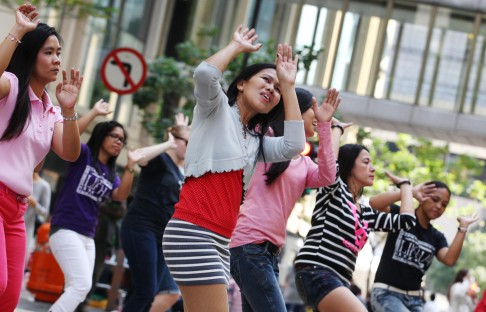
Letters to the Editor, November 7, 2015

Getting back to the basics of education
Last month, Hong Kong played host to the inaugural Tri-city Education Forum, a platform founded jointly by Shu-Te University in Kaohsiung, Taiwan, the Confederation of Guangdong Principals, and the Gifted Education Council of Hong Kong. The purpose is to champion a new era in education.
The theme of the first symposium was based on the ideas of American philosopher, psychologist and education reformer John Dewey. Several Dewey scholars spoke at the symposium, sharing their research and findings on Dewey's philosophy of pragmatism with the invited participants. The insights from these speakers enriched our understanding of Dewey's philosophy on education.
Dewey was the PhD supervisor of Chinese philosopher Hu Shih at Columbia University in the US from 1915 to 1917. Hu was then a Chinese nationalist diplomat and scholar, and an important leader of Chinese thought who helped establish the vernacular as the official written language. He was the foremost political liberal in republican China (1912-49), advocating building a new country not through political revolution but through mass Chinese education.
Afterwards, Hu went on to become one of the leaders of China's May Fourth Movement and the New Culture Movement. He believed that education was urgently needed to open a new road for China's future. He embraced Dewey's pragmatic philosophy in both his professional and personal life.
Dewey believed that powerful educational experiences are a result of two fundamental principles: continuity and interaction. Continuity refers to the way experiences, both past and present, influence the future. Interaction refers to how one's current situation influences these experiences. This means that human experiences - past, present and future - influence our capacity to learn. This philosophy had a significant impact in the earlier half of the 20th century in China's education and philosophy sectors.
All educators should find a way to better shape the competitive edge for their students in this ever-changing world. Maybe it is now time to turn to Dewey's basic education system, which included such beliefs as: education is life, school is society, and integrating teaching and learning.
Dr Raymond Tam, chairman, Gifted Education Council, principal, G. T. (Ellen Yeung) College
No wish to live life as a workaholic
Hong Kong should absolutely regulate working hours. In the absence of legislation, Hong Kong people must work endlessly and are regarded as lazy or inefficient if they could not finish their work in time.
It is sad and worrying to know that in the near future, I might be one of these working machines, if nothing is done now to improve the work-life balance.
Many people are either too busy or too exhausted to exercise or do something enjoyable after work. But if their schedule becomes more stable (no overtime work), they will be less tired and will have a better work-life balance.
I believe work efficiency will increase, too, as when workers know that they can get off work punctually under the protection of legislation, they will work hard to complete their work as quickly as possible. They won't want to spend more time in the office unless they are workaholics.
As a Secondary Six student who will soon be joining the workforce, I really hope our freedom and right to live as a human being will be safeguarded. I do not wish to be a working machine. I hope the government will pay more attention to this issue and protect the working class.
Vanessa Wan, Tai Wai

Offer courses to helpers on days off
I refer to the letters by Ruan Wen ("Give helpers venues where they can meet", October 23) and Charlotte Chan ("Helpers could try country parks to meet", November 1).
They both have a good point; however, in a densely populated Hong Kong where everyone is fighting for more living space, won't it be better if our Hong Kong government could provide helpers with training courses in community centres or city halls to go to during their days off? These could be language or personal development classes.
This will prevent them from mixing with the wrong company, which most of Hong Kong employers are afraid of; and will certainly be a more meaningful way for them to spend their days off.
Also, nowadays, it is not uncommon for maids to have to look after family members with certain health conditions, such as Parkinson's disease, Alzheimer's disease or dementia; or elderly family members with high blood pressure and diabetes who need constant monitoring.
In such cases, professional training courses can be offered to the helpers, who often have no experience in looking after people with such conditions.
Wouldn't this be a more meaningful way for helpers to spend their days off, rather than mingling with other helpers?
Eunice Li Dan-yue, Causeway Bay
Change on terrace dining is baffling
Recently there was the ridiculous situation of the MTR banning large musical instruments. Now the Silvermine Bay Resort in Lantau is being banned from serving customers on its terrace, having done so without problem for the last 15-odd years. What is wrong with the bureaucracy in Hong Kong?
Last weekend, I went there for dinner, thinking I could sit under the stars and enjoy the moonlight - only to be told that there was no service on the terrace. If one wanted to eat there, one must first go inside, order, pay, then wait outside for the bell to ring. At which time one must go and serve oneself - at the restaurant of a major tourist hotel.
The government is worried about the decrease in tourists. Such insistence on petty and outdated regulations might explain somewhat why tourists are reluctant to return to Hong Kong.
Peter Cope, Mui Wo
First, remove missiles aimed at Taiwan
The rulers in Beijing have often stated that one of their main goals is the reunification of the mainland and Taiwan. They consider the island state a "renegade province" and some decades ago fired thousands of shells at the islands of Quemoy and Matsu, only a few kilometres from the mainland.
Although the relationship is no longer so violent, it is not normal or healthy. Cross-strait investments are merely economic links which can often be a form of exploitation of cheap labour or a way of escaping environmental restrictions. The real movement towards reunion can only take place when military threats are removed; when people on both sides trust each other and learn to accommodate their differences.
For this reason, mainland China must remove its threatening missile bases which are aimed at the Chinese people in Taiwan. Some military observers put the number at around 600 or more. Whether they are nuclear-armed or not, they impose a severe psychological burden on defenceless civilians.
Any Chinese military man whose weapons are aimed at Chinese civilians cannot claim he is a patriot, since a patriot loves and protects his countrymen.
A ruler who removes military threats to his own people would be worthy of a Nobel Peace prize. Are there any in China who are willing to take this brave step?
Jason Kuylein, Stanley
University not the only path to success
Going to the university is a dream come true for most students. Yet that path may not be suitable for all. Students should not have a herd mentality.
No doubt a university education is rated highly by society and graduates are said to have a higher chance of finding employment. But studying with the mindset that a university education leads to success makes us blind. Sometimes we study so hard to gain a place in university but can't tell why it is necessary to do so in the first place.
I am not saying a university education does not benefit students at all. It can equip students with the skills and knowledge required to secure their future, but getting a degree is not the only road to success.
There are many examples of non-graduates making a success of themselves. Many have become a chef or an artist through institutes such as the Hong Kong Culinary Academy and the Hong Kong Academy for Performing Arts.
We should think carefully about what we want to accomplish in life and which path is more suitable for us. If we blindly follow others, we may discover later that we have squandered our precious years.
Lam Tsz Wai, Yau Yat Chuen